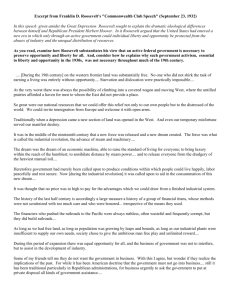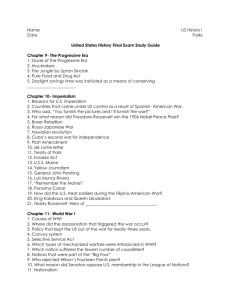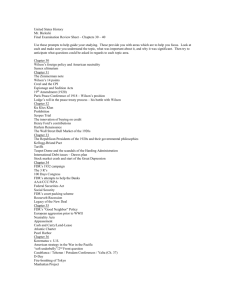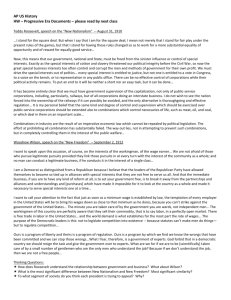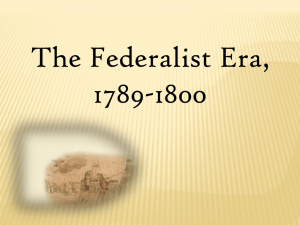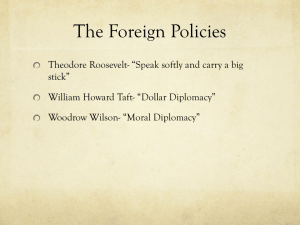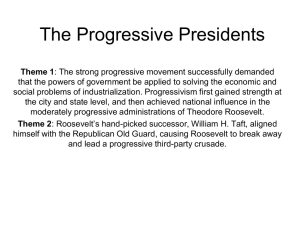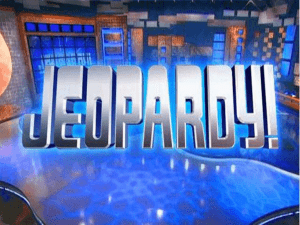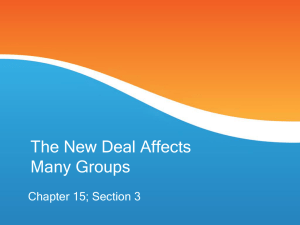File
advertisement
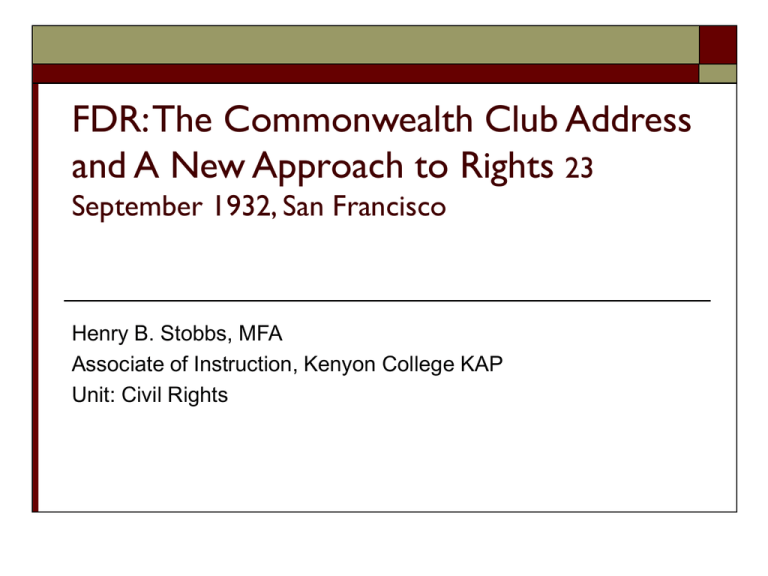
FDR: The Commonwealth Club Address and A New Approach to Rights 23 September 1932, San Francisco Henry B. Stobbs, MFA Associate of Instruction, Kenyon College KAP Unit: Civil Rights Copyright Notice Certain materials in this presentation are included under the fair use exemption of the U.S. Copyright Law and have been prepared with the multimedia fair use guidelines and are restricted from further use. Background Context Depression Stalin Mussolini Hitler Tojo The issue of Government, as FDR Sees It Do individuals exist to serve systems of government and economics? Do governments and systems of economics exist to serve individuals? The Road to Progress Alludes to Meredith Nicholson’s definition of democracy as “…a quest, a never-ending seeking for better things…” then adds “and in the seeking for these things and the thriving for better things, and in the seeking of these things and the striving for them, there are many roads… but only two general directions.” The Privilege of Government Echoes Hobbes and Locke, as well as A.d.T Central tenet: Rulers bear a responsibility for the welfare of their subjects Criticizes Hamilton: “He was too impatient… fundamentally … believed that the safety of the republic lay in autocratic strength of government…the destiny of the individual was to serve the government Jeffersonian Ideals FDR’s Interpretation of TJ: “Government was a means to an end, not an end in itself.” The people had two sets of rights: “personal competency” rights Rights related to acquiring and possessing property The exercise of property rights might interfere with personal competency rights that the government must intervene to protect individualism Outcome of Hamilton vs.Jefferson Jefferson (Democratic Republicans / Democrats): 1 Hamilton (Federalists / Whig / Republican): 0 Individualism triumphs over elitist republicanism, democracy trumps autocracy 19th Century: The Age of Industrialism While there was a frontier, poverty could be solved by heading West What happens when there’s no more West to flee toward? The rise of the machine age, the potential for rising standards of living for all Government assumes a new role; enabler of “ruthless” industrial expansion “It has been traditional particularly in Republican administrations for business urgently to ask the government to put at private disposal all kinds of government assistance” Dangerous Last Frontier No more free land Industrial combinations uncontrolled and irresponsible units of power within the State Opportunity no longer equal – a new feudalism had emerged Trust-busting Theodore Roosevelt: “[T]he first great Republican progressive” TR’s impossible mission: “…To destroy the large combinations and return to the time when every man owned his individual small business.” Forced to play favorites between “good trusts” and “bad trusts” SCOTUS: “Rule of Reason”: a concentration of power is permissible if the method by which it got its power, and how it used that power, was reasonable. 1912: Enter Woodrow Wilson, Stage Left Jefferson: feared the encroachment of political power upon individuals’ lives Wilson: Power is financial: The greed and irresponsibility of a highly centralized economic system, upon whom great masses of individuals depend for their safety and livelihood, would if not controlled reduce its “subjects” to “starvation and penury” World War I Stifles Wilson’s Plans The situation was bad during Wilson’s time, but worse now, because Wilson was forced to abandon his domestic dreams to the realities of international war Equality of opportunity no longer exists Industrial plant built – perhaps overbuilt No more free land More than half the populous own no land, do not labor as farmers The Effect of Tariffs Canadian borders closed to trade European borders closed to trade Latin American borders closed to trade Much of Asian markets closed to trade Industrialists going offshore – outsourcing (familiar?) Rising unemployment Limited Opportunities The great corporations have eliminated the possibility of small enterprise Highly organized, efficient competitors have “squeezed out” the small-holder (the corner grocer, anyone?) Business concentration: two-thirds of business controlled by 600 corporations; 10,000,000 people control the remaining third By the end of the century: all American industry controlled by a dozen corporations run by a hundred men – economic oligarchy Re-appraisal of values Needed Task of “enlightened administration”: Administer resources and plants on hand Seek to reestablish foreign markets for surplus production Meet the problem of underconsumption Adjust production to consumption Distribute wealth and products more equitably Adapting existing economic organizations to the service of the people FDR’s View of Government’s Role “To assist the development of an economic declaration of rights, an economic constitutional order” by “modifying and controlling our economic units” (corporations) Goal: “A more permanently safe order of things” Rights Right to life: right to make a comfortable living “Our government… owes to everyone an avenue to possess himself of a portion of that plenty sufficient for his needs, through his own work” – compare: “To each, according to his needs; from each, according to his ability” More Rights Right to property: “…a right to be assured, to the fullest extent attainable, in the safety of his savings” This right is paramount; all other property rights must yield to it Standing in the Way “Princes of property” versus “enlightened businessmen” “Responsible heads of business and finance must work together to achieve a common end.” Government’s job: if they can’t do it on their own, we’ll make them do it. Another Right Liberty and the Pursuit of Happiness Individual liberty and happiness are meaningless unless ordered so that “one man’s meat is not another man’s poison” Rights of personal competency “must be respected at all hazards” “Liberty to do anything which deprives others of elemental rights is outside the protection of any compact” Government’s role: to maintain balance between liberty and responsibility Enter Faith, Stage Left New terms for the old social contract Goal: realize Jefferson’s “apparent Utopia” – neither he, nor Teddy Roosevelt nor Wilson were able to pull it off, but… “We must do so, lest a a rising tide of misery engendered by our common failure, engulf us all… we must all shoulder our common load.” Just one Opinion Bibliography Roosevelt, Franklin Delano. “Commonwealth Address.” [Speech]. Del. 23 Sept. 1932, San Francisco, CA.
